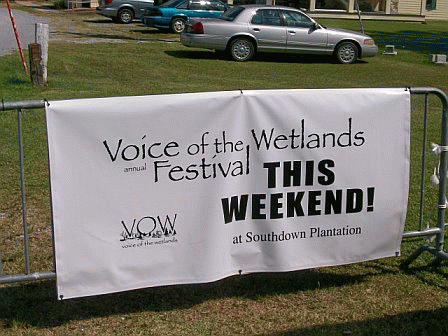What is the Voice of the Wetlands Festival exactly? Well, the details are a little obscure, but the story starts with Tab Benoit, the well-known Cajun Blues singer who won the 2007 Contemporary Blues Male Artist of the Year and B.B. King Entertainer of the Year Awards. He grew up in the middle of Cajun country, Houma, Louisiana to be exact, although he was born in Baton Rouge on November 17, 1967, a passionate Scorpio for the astrologically inclined. He attended venerable old Vandebilt Catholic High, although school must have seemed secondary to his two true loves in life: the guitar and the wetlands. He started taking to both at an early, early age, including rope-swings overhanging the bayous, and has remained committed to both to this day, excelling with the one and struggling ferociously to save the other. And out of this intense emotional cauldron of music, art and deep love for Louisiana's wetlands was born the organization, Voice of the Wetlands.
, where Tab Benoit went to school.
Here are Tab's thoughts on his transformation to a wetlands activist:
Have you ever loved a place so much that you dedicate your life to saving it? You know, I believe that my highest calling is to be a steward of the environment. My first job was as a pilot. From up here the awful truth hits you: these wetlands are disappearing right before our eyes. The wetlands we've lost just since my parents were born is bigger than the whole state of Delaware. You see, coastal erosion in Louisiana picks everybody's pocket. (quoted from Hurricane on the Bayou)
This devastating realization drove Benoit to found, along with other concerned citizens, the Voice of the Wetlands in 2003, a nonprofit group dedicated to spreading the truth about Louisiana's disappearing coastline through, primarily, music. VOW, as they are also known, held their first music festival in 2004, well before Katrina struck, so they were already struggling to raise awareness about the relationship between hurricanes and wetlands loss. In fact, Tab was actually working with director Greg MacGillivray as one of the individuals highlighted on the 2006 IMAX documentary Hurricane on the Bayou, which was to be a critical look at what might happen if a large hurricane hit New Orleans. Just as they were wrapping up the movie, monstrous Katrina did hit New Orleans, life imitating art, compelling them to rewrite and reshoot the film to include Katrina as a living example of what can happen when the wetlands are dramatically reduced in a storm-prone region.
Here are the first paragraphs of Voice of the Wetland's mission statement:
Benoit expounds on this more fully in Hurricane on the Bayou:"By redirecting the Mississippi River from it's natural flow, south Louisiana's wetlands are being taken over and destroyed by the stronger current of the Gulf of Mexico at an alarming rate. The loss of south Louisiana's wetlands contributes to the loss of our unique culture, our heritage, our wildlife, our people and their livelihood."
Voice Of the Wetlands (VOW) is an organization (click here for their website) that is made up strictly of volunteers who dedicate their talent, time and resources to bring global attention to south Louisiana and the world's coastal erosion problem.
"Well, basically what went wrong is that in the 1930s, well-meaning engineers (the Army Corps of Engineers) built levees or walls, so-to-speak, along the banks of the Mississippi to protect the farms from yearly floods. Those annual floods deposited the soil that rebuilt the wetlands. Now with those levees, that soil gets flushed into the ocean. All that brown in the ocean (aerial shot of brown-colored stream in the Gulf), soil that could be rebuilding the wetlands the way it used to, before we interfered with Mother Nature.
We also made a mistake by digging canals for boat navigation. These canals brought in saltwater from the ocean, killing the marsh grass and the trees. This whole forest (footage of wetlands forest) is now dead. Without the tree roots, erosion speeds up." (ibid.)
Tab is really referring, without naming names in the movie, to, primarily, the giant oil and gas companies and related industries, Shell, Exxon, Texaco, to name a few of the "land barons" in Louisiana who are responsible, according to the Gulf Restoration Network, for 40% to 60% of the wetlands loss, companies that for decades have been paying scant attention to the havoc they are wrecking on the environment while they pursue the bottom line, much like Great White Sharks swimming around in the ocean mindlessly devouring everything within sight and smell.
(Note: You can view every article as one long page if you sign up as an Advocate Member, or higher).





